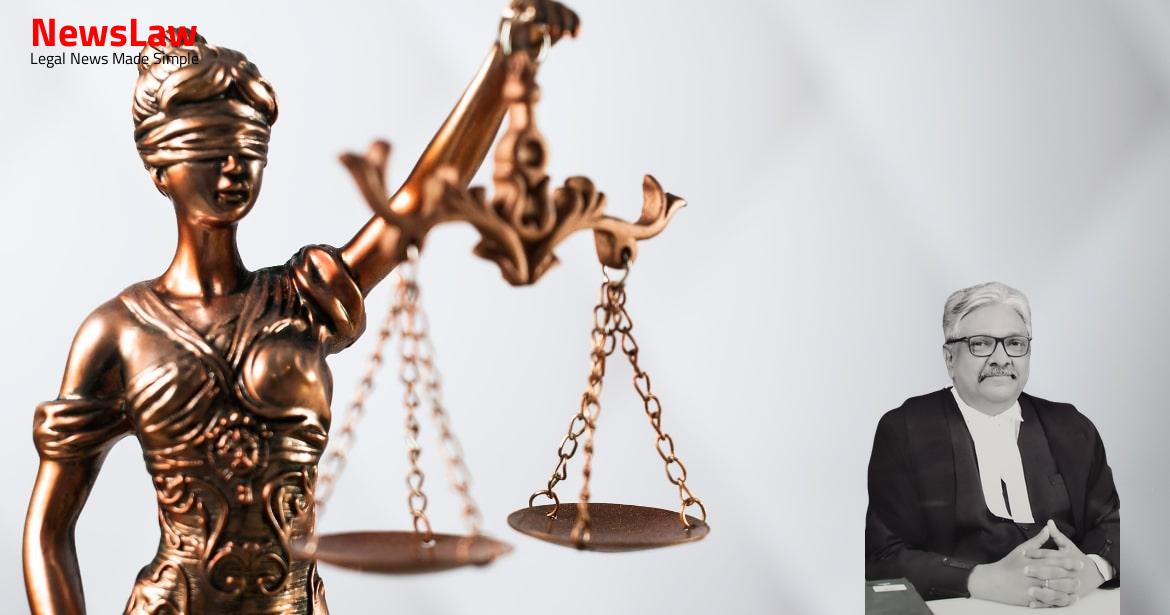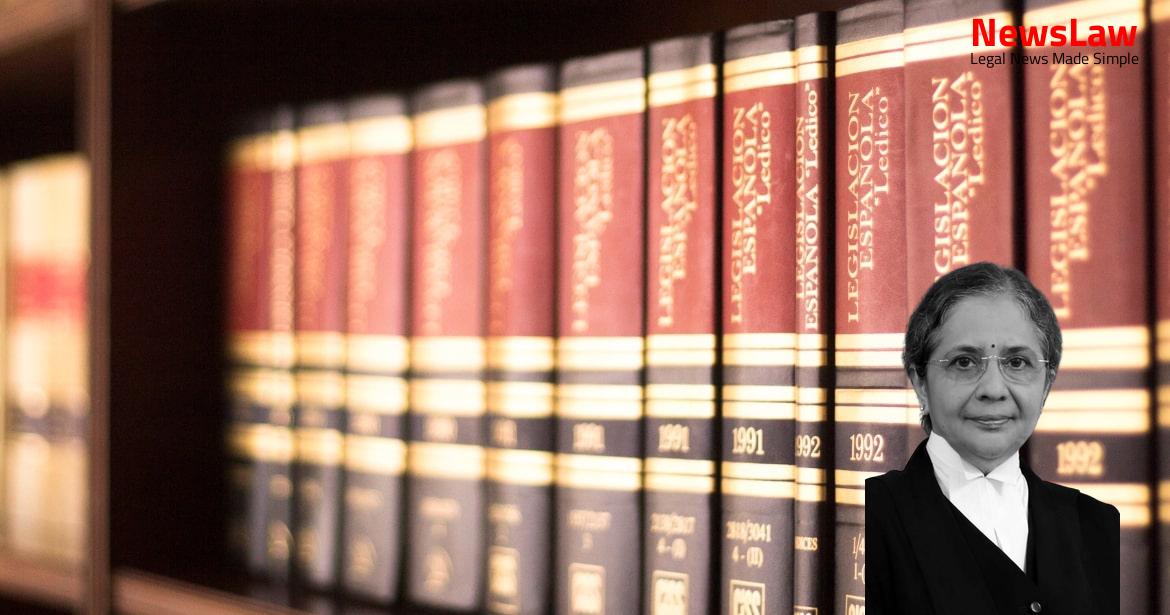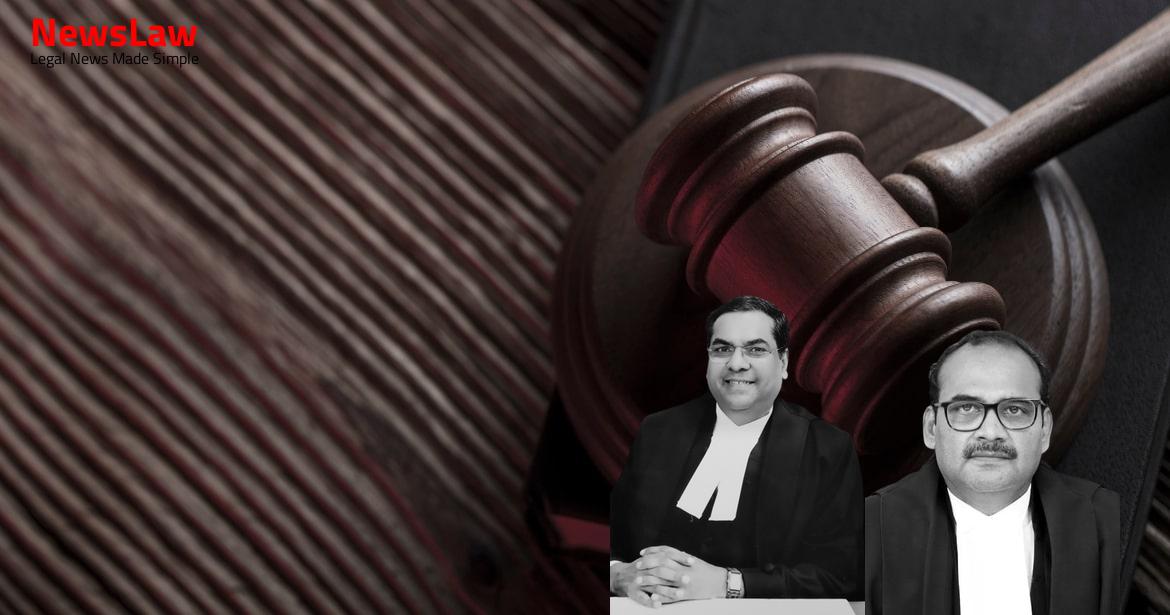Explore a detailed legal analysis of a recent court case focusing on the conviction under Section 411 of the IPC. The court’s assessment of the essential elements required for proving guilt in cases involving receiving stolen property is dissected, shedding light on the nuances of the legal system and evidentiary standards. Delve into the complex world of criminal law through the lens of this insightful court judgment.
Facts
- Truck driven by Gurmel Singh failed to reach its destination at Satna
- Truck driver was murdered by Sadhu Singh alias Vijaybhan Singh and co-accused Raju alias Rajendra
- FIR registered for offence under Section 406 of IPC
- Complainant Abhay Kumar Jain reported that the truck loaded with household articles was missing goods
- Accused charged for offences under Section 411 of IPC for selling goods at cheaper rates
- Loaded goods in the truck were looted
- Appellant Shiv Kumar and co-accused Shatrughan Prasad dishonestly received stolen articles
- Truck found with missing goods on Galla Mandi, Satna
- Appellant and Shatrughan Prasad were charged with receiving stolen property under Section 411 of the IPC.
- Court concluded that the accused were aware that the articles seized from them were stolen property.
- Appellant was exempted from surrendering by Court’s order dated 6.9.2019.
- Both accused were found selling articles at cheaper rates.
- High Court disposed of three appeals, including the one filed by Sadhu Singh alias Vijaybhan Singh Patel who was convicted for murder and other offences.
- Appellant’s conviction under Section 411 of the IPC was affirmed on appeal by the High Court.
- Limited notice initially issued on 4.10.2019 only on the quantum of sentence, later decided to examine the challenge to the conviction itself on 9.5.2022.
- Prosecution proved that appellant and co-accused Shatrughan Prasad received stolen articles from a truck knowingly, committing an offence under Section 411 of the IPC.
- Trial Judge noted that articles looted from the truck were seized from the possession of the appellant and co-accused Shatrughan Prasad through seizure memos (Ext. P-4 and Ext. P-5).
- Co-accused Sadhu Singh convicted for murder and related charges.
Also Read: Insurance Claim Repudiation due to Fire Incident: Court’s Legal Analysis
Arguments
- The State’s counsel argues that the appellant was in possession of the property for a specific period based on the disclosure statement of other accused individuals.
- The State’s counsel asserts that the articles were being sold at cheaper rates, indicating fulfillment of the elements under Section 411 of the IPC against the appellant.
- Reference is made to a case, Nagappa Dondiba Kalal v. State of Karnataka, where it was observed that the accused could be convicted as a receiver of stolen property knowing it was stolen.
- The State Counsel emphasizes that there is sufficient material and evidence on record that proves the guilt of the accused beyond reasonable doubt.
- Citing the case of Sambhu Das alias Bijoy Das & Anr. V. State of Assam, it is stated that the Supreme Court, under Article 136 of the Constitution, will not reopen findings of the High Court when there are concurrent findings of facts and no question of law involved.
- Essential ingredients of Section 411 IPC not made out for appellant
- Prosecution failed to show accused had knowledge stolen articles
- Knowledge of accused on nature of articles sold must be established for conviction under Section 411 IPC
Analysis
- In the case of Trimbak vs State of Madhya Pradesh, essential ingredients for conviction under Section 411 of the IPC were discussed.
- Justice Mehr Chand Mahajan outlined the requirements for guilt under Section 411 IPC pertaining to stolen property possession and knowledge.
- The prosecution failed to establish that the appellant had knowledge that the seized articles were stolen goods.
- The court must consider other evidence against an accused person before relying solely on a confession for conviction.
- Justice K. Subba Rao explained the concept of ‘dishonestly’ in relation to intention to deceive and expose to injury or risk.
- The Prosecution’s evidence is found to be unreliable and lacks credibility.
- The seizure procedure was not conducted properly, and discrepancies were noted in testimonies.
- The evidence does not establish the appellant’s awareness of dealing with stolen goods.
- Inconsistencies exist in the testimonies of witnesses PW-5, PW-22, and PW-24.
- The value of seized goods and the lack of specific details weaken the prosecution’s case.
- The disclosure statement of other accused is not sufficient to prove the appellant’s knowledge of dealing with stolen goods.
- The prosecution failed to establish a basis for the appellant to believe the seized goods were stolen.
- Section 411 IPC deals with dishonestly receiving stolen property
- The section outlines the offense of receiving or retaining stolen property knowingly or with reason to believe it is stolen
- The punishment for this offense can include imprisonment for up to three years, fine, or both
- The term ‘dishonestly’ is defined in Section 24 of the IPC as acting with the intention of causing wrongful gain to one person or wrongful loss to another
- The appellant was erroneously convicted under Section 411 IPC.
- It was not established that the appellant dishonestly received stolen property with the knowledge and belief that the goods found in his possession were stolen.
- In line with the test applied in Trimbak [supra], the conviction of the appellant cannot be sustained.
Decision
- In the specific part of the judgement, the appellant has been acquitted.
- The appeal has been allowed with this order.
Case Title: SHIV KUMAR Vs. THE STATE OF MADHYA PRADESH (2022 INSC 933)
Case Number: Crl.A. No.-001503-001503 / 2022



